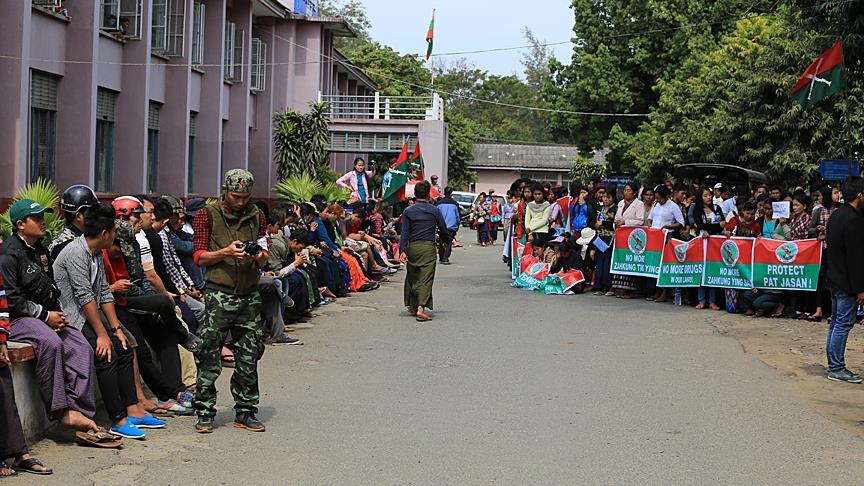Myanmar official says peace needed to curb drug problem
Myanmar remains world's 2nd biggest producer of opium, from which heroin is made
 Hundreds of people stage a demonstration in Myanmar’s northern city of Myitkyina on Friday, February 26, 2016 after an anti-drug vigilante group was attacked by armed farmers as they attempted to destroy poppy fields. (Zaw Moe Htet - Anadolu Agency)
Hundreds of people stage a demonstration in Myanmar’s northern city of Myitkyina on Friday, February 26, 2016 after an anti-drug vigilante group was attacked by armed farmers as they attempted to destroy poppy fields. (Zaw Moe Htet - Anadolu Agency)
By Kyaw Ye Lynn
YANGON, Myanmar
A senior Myanmar government official stressed Monday that peace with ethnic armed groups is vital to the success of the country’s war on drugs, as the United Nations Office on Drugs and Crimes (UNODC) launched its latest report in Nay Pyi Taw.
Myanmar remains the world's second biggest producer of opium, from which heroin is made, according to UNODC’s World Drug Report 2016.
Home Affairs Minister Kyaw Swe said at the report launch Monday that drug eradication could not be implemented successfully without cooperation from ethnic rebels.
“Most poppy plantations are in border areas which are under control of some ethnic armed groups,” Kyaw Swe told reporters.
Since Myanmar (then Burma) gained independence from Britain in 1948, the country has been subject to dozens of internal conflicts with rebels fighting on ethnic and religious grounds for their own territory -- some of which have become the world's longest wars.
Some of the groups -- in particular the United Wa State Army -- have cultivated large areas of opium plantations to fund their operations, while the country’s powerful military -- which ruled the country for 50 years -- and its militia alliances have also faced blame.
In October 2016, the previous government signed a Nationwide Ceasefire Agreement with eight rebel groups, however, at least 13 -- including the main players -- rejected it as it excluded of three small factions.
“We want peace with ethnic armed groups. We need peace with them to achieve our war on drugs,” Kyaw Swe was quoted as saying.
The new government, led by State Counselor Aung San Suu Kyi, has since made peace with rebels a priority.
On Sunday, Myanmar authorities burned seized drugs and chemicals worth around $60 million in Nay Pyi Taw, the commercial capital Yangon and the second largest city of Mandalay to mark the UN's annual anti-drugs day.
In 2012, Myanmar admitted that its 15-year drug eradication plan (that ran from 1999-2014) would fail, and extended it until 2019, due to rising production.
Anadolu Agency website contains only a portion of the news stories offered to subscribers in the AA News Broadcasting System (HAS), and in summarized form. Please contact us for subscription options.






